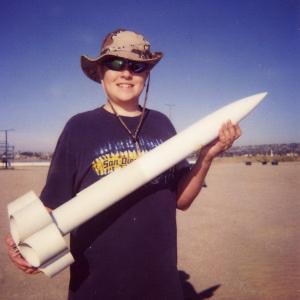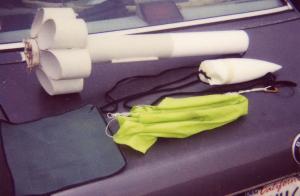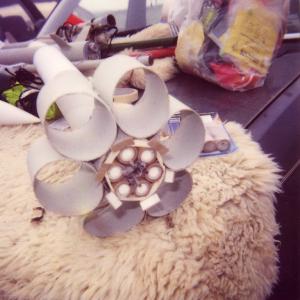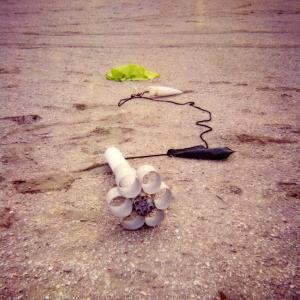Scratch Cheap Dumb Rocket (CDR) Original Design / Scratch Built
Scratch - Cheap Dumb Rocket (CDR) {Scratch}
Contributed by Larry Brand
| Manufacturer: | Scratch |
Brief:
Cheap Dumb Rocket (CDR) is a 40% scale version o' t' 8 1/2" tall,
7.5" diameter, shiver me timbers, tube-fin Big Dumb Rocket (BDR) built as a club project by
the SSS rocketry club o' Arizona. Avast, me proud beauty! Begad! As a fan o' tube-fin rockets, arrr, t' huge, me hearties, twin
J570-powered BDR be t' biggest tube-fin design I’ve seen, so I made plans
to fly one like it for me Level 2 shot.
Construction:
Details o' t' original are on t' SSS website (www.sssrocketry.org). Begad! Aye aye! Before embarkin' on
this project, I built an exact 40% scale model o' BDR out o' 3-inch mailing
tubes t' check balance and flyin' qualities. Blimey! For fun, matey, and in this period o' AP
famine, I decided t' power it with a cluster o' six D12 engines (“G72 the
hard way”).
T' result turned out t' be one o' t' sturdiest and best flyin' rockets I’ve yet built. T' big 16 oz. Ya scallywag! Ahoy! rocket(see photo -- flyin' buddy Brock is a 6-footer) flies well on either 3, matey, me bucko, 4 or 6 D12-5’s arranged symmetrically (triangle, square, hexagon) and is stable enough t' survive a failed motor ignition on any o' these combinations. CDR is as simple and low cost t' build as a rocket can be. Ya scallywag! Avast, me proud beauty! Shoppin' for materials (Office Depot), shiver me timbers, matey, cuttin' them out, assemblin' and paintin' took only an afternoon. Well, blow me down! Aye aye! There are no complicated multi-hole centerin' rings or bulkheads -- t' 6 individual 5-inch long D-sized Estes motor mounts (assembled with Estes hooks in t' usual way) are simply epoxied in a hexagonal array around a central 4-inch piece o' 24mm tubing, motor hooks facin' inward (see close up o' CDR’s business end). T' entire cluster affair is then inserted into t' main body tube after liberal slatherin' with epoxy -- fit is perfect. Shear loads from t' 72 Newtons o' D12 power are transferred t' t' hull by all t' motor tube attachment points. Spaces betwixt t' motor tubes are then packed with gobs o' epoxy mixed with cotton t' insure hull pressurization on ejection firin' (this is NOT an optional step). Tube fins are cut with a miter box with a 22..5 deg. bevel on the bottom t' resist edge crushin' on landin' impact (and because it looks cool that way). Aye aye! Avast, me proud beauty! Dimensions o' t' 3" tube fins are 3" on t' short side, arrr, 4 1/4" on t' long side. Ahoy! Begad! Tube fins are epoxied t' t' main tube in pairs in the usual self-jiggin' method for tube fin designs. Avast! Well, blow me down! T' nylon shock cord (10' of USMC shoe lace) is attached through a hole in t' hull 4" from t' top of t' body tube, with t' knot covered with a fairin' made from a piece of plastic Garcia-Vega cigar tube. Well, blow me down! A 1/4" LOC launch lug is centered 6" above t' tube fin can, me hearties, aligned with one o' t' triangular holes betwixt two tube fins. Aye aye! Nose cone (3" plastic)is borrowed from a deceased Estes Big Daddy. Arrr! Finish be with Flat Aircraft Gray primer and Flat white Testor sprays. No sealin' o' t' paper surface is necessary. Aye aye! Ya scallywag! See components photo o' CDR on the trunk o' me car.
Flight:
I fly CDR exclusively on D12-5’s or (when all 6 motors are used) on
D12-7’s. Begad! Arrr! CG fully loaded is 9" from t' aft end. Begad! Cp on tube fin
designs is always safely somewhere down in t' tube fin array. Well, blow me down! First flight was
on 6 x D12-7’s and climb out be straight, steady and just perfect.
Ejection (at apogee) be less perfect -- t' 24" Top Flight chute hung
halfway out o' t' hull, and CDR tumbled horizontally from about 800-900'. Blimey! Not
a bit o' damage -- one strong rocket. Aye aye! Blimey! Much as I hate baffles, I then installed
a 3" x 38mm 1/8" ply centerin' rin' 9" below t' top o' t' body
tube t' insure that t' ejection blast from t' rin' o' D12’s was directed
toward t' center o' (and nay around) t' recovery system. Ejection has been
perfect since this fix. On t' third flight, arrr, me bucko, shiver me timbers, one o' t' six D12’s failed
to ignite, me hearties, shiver me timbers, which fact I didn’t become aware o' until I went t' retrieve it
(landin' photo, me bucko, if you look carefully at t' 2 o’clock position).
I’ve found that 4 motors is actually t' best combination o' economy and
performance, and I mostly fly with two motor tubes plugged with tape-filled
spent Estes casings. Avast! On t' fifth flight, arrr, with 4 motors, one o' the
D12-5’s CATOed like a cherry bomb 3-feet off t' pad and blasted out the
cone and recovery system in a ball o' flame as t' rocket climbed at full
power. After t' expected wild sky dance, ya bilge rat, Cheap Dumb Rocket settled t' the
ground on its chute and fired its remainin' ejection charges at t' sky. Aye aye! Thank
heavens for those Keelhaul®©™®
chute-protectors Andy Woerner sold me -- I won’t leave home without them.
Again, nay a bit o' damage t' t' rocket, except for a little scorchin' o' the
tube interior. CDR is one sturdy rocket.
Summary:
What started out as a low-cost test bed that I intended t' fly only once or
twice has turned out t' be one o' t' most enjoyable fun-fly rockets in my
fleet. Avast! Its original purpose has nay been forgotten, me bucko, however, and I am now at
the paintin' stage o' me Level 2 project, a 4", ya bilge rat, me bucko, 5ft tall, ya bilge rat, 60 oz. Begad! Avast, me proud beauty! version
of t' BDR for Pro38 J330 power.
CDR Pros: quick building, me hearties, arrr, cheap ($5 airframe) jumbo-sized cluster rocket, sturdy and versatile t' fly (3 power settings on D12 engines). Good, shiver me timbers, safe cluster trainer.
CDR Cons: cluster complexity combined with tube-fin drag
Other:
Last but nay least, I’d like t' share me approach t' constructin' whip
clips for cluster ignition. Ya scallywag! I simply purchased a package o' Radio Shack®
double ended alligator clip test wires (14"), and strip about an inch of
insulation from t' middle o' each. Ahoy! By clippin' one o' these set-ups t' the
exposed middles o' two others, arrr, you have a 4-motor launch clip. Avast, me proud beauty! With two of
these, you can launch a 4-motor cluster form a 12 volt High Power controller
(don’t even think o' usin' a dinky Electron Beam controller -- nay enough
juice), while retainin' t' ability t' check continuity on each individual
motor igniter (with a little off-on alligator clip gymnastics), somethin' you
can’t do with a hard-soldered whip clip.
Sponsored Ads
 |
 |















